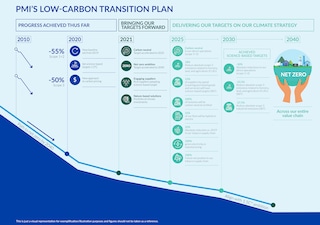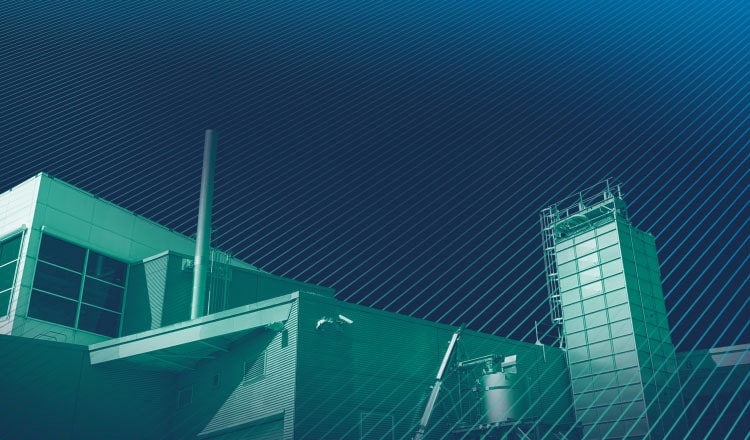Concrete climate action aligned to decarbonization needs
As a major multinational corporation with thousands of stakeholders round the world, we at Philip Morris International (PMI) have been increasingly engaged with aspects of sustainability in our products and processes. Our company is transforming into a science- and technology-powered business with the aim of delivering a smoke-free future—a future without cigarettes. We are focused on our most material impacts on society, including product health impacts. Addressing the environmental footprint of our operations is a critical component of this and of developing technologies and practices to decarbonize our business and safeguard the long-term interests of all our stakeholders. As the urgency of the climate crisis becomes more pressing, we are increasing the pace of our initiatives, bringing forward target dates for carbon neutrality. To achieve these targets, we have a detailed practical plan to decarbonize our value chain.
This executive summary is drawn from our 2021 Low-Carbon Transition Plan (LCTP). The LCTP provides technical details on how we are working within the company and with others to cut greenhouse gases aggressively, especially carbon emissions, and achieve the climate goals we have set for our company.
We closely follow the guidelines of the Science Based Target initiative (SBTi) partnership to set meaningful emissions reduction targets. In 2020 the SBTi assessed and approved that our targets aligned with a 1.5°C global temperature scenario as outlined in the Paris Climate Agreement. To help us achieve this we are now introducing a new goal—for PMI critical suppliers to adopt science-based targets in line with the SBTs that the company has committed to, as aligned with the 1.5°C pathway necessary to meet the goals of the Paris Agreement. We are certain that by including and engaging with our supply partners we can accelerate the transition toward a net-zero sustainable economy. Supplier engagement will be essential for us to meet our new carbon neutrality target date of 2040 for scopes 1+2+3 (entire value chain). This advancement by 10 years reflects our commitment to combating climate change.
Our aims:
Carbon neutrality
Achievement of carbon neutrality of PMI’s
direct operations (scope 1+2) by 2025
Net-zero emissions
Achievement of net-zero emissions of PMI’s
value chain (scope 1+2+3) by 2040
Engaging suppliers
PMI's critical suppliers to adopt science-based targets (SBTs) in line with PMI's own, aligned with the 1.5°C pathway necessary to meet the goals of the Paris Agreement
Decarbonizing fast to create long-term value for all
At PMI, we are pursuing a business transformation to deliver a smoke-free future. We are targeting at least 50 percent of total net revenues to come from smoke-free products by 2025, compared to zero in 2015. We are equally ambitious in addressing the climate change crisis with our many initiatives tackling reduction of our GHG emissions, climate change mitigation, and adaptation measures. Driven by the imperative of sustainability, we are working to minimize carbon emissions from our products and processes. This is proving to be an important driver of opportunities for innovation, growth, and long-term value creation.
Our sustainability strategy is founded on the principle that companies today must deliver more than shareholder value. Long-term success requires creating value and sharing it through sustainable approaches and practices for the full diversity of stakeholders, including employees, customers, suppliers, and communities.
We have tightened our timelines for systematic decarbonization
Carbon emissions are a major contributor to the climate crisis and one of the principal threats to our planet. This is why reducing carbon emissions is a high priority for PMI. We have adopted international standards that enable us to benchmark against sustainability leaders and to identify areas for improvement. Hence, with third-party verification according to ISO standard 14064-3, we calculate our GHG footprint annually, accounting for all relevant emissions generated across the entire value chain.
Initially, in 2019, we had aimed to be carbon neutral on scopes 1 + 2 (direct emissions) by 2030, but in view of the growing urgency of climate change, we now expect to reach this target five years ahead of schedule—by 2025. For the more comprehensive scopes 1+2+3 (entire value chain), we are now targeting carbon neutrality by 2040. This restated date is 10 years earlier than originally planned, in 2019, underlining PMI’s firm ambitions. Our company is making progress in reaching these targets, having already lowered emissions by more than half against the 2010 baseline. We forecast less than 400,000 tons of CO2e direct emissions in 2021 vs. the 2010 baseline.
Reduce consumption, switch to renewable energy, and compensate unavoidable emissions
For the practicalities of achieving our emissions targets, we have a threefold approach. We reduce energy consumption and optimize efficiency to cut emissions. We minimize the use of fossil fuels and promote switching to renewable energy. And, recognizing that some emissions will still be unavoidable, we compensate for them by prioritizing insetting projects (nature-based solutions) and by purchasing high-quality carbon credits.
In our operations, we are reducing emissions and increasing efficiency with two main programs: Zero Carbon Technology (ZCT) and Drive4Zero (D4Zero). ZCT involves initiatives such as biomass burners combined with thermal storage and solar photovoltaics for carbon emission reduction, and carbon capture and storage. With D4Zero, every worker in operations looks out for points in processes where energy, water, or materials are being lost. Workers are empowered to recommend and implement solutions and to promote efficiency improvements not only across the factories but also throughout the company. D4Zero is one of the ways that the company encourages workers, suppliers, farmers, and new employees at every level to be actively engaged in more sustainable actions in line with the company’s climate action targets.
To provide a financial lever for climate action, both governments and businesses think that carbon pricing can be an effective incentive to reduce carbon emissions and purposefully allocate resources.
Accordingly, in 2020 we adopted a shadow carbon price of USD 65 per ton of CO2e and a carbon levy of USD 8 per ton of CO2e. Our shadow carbon price is a theoretical cost that must be integrated into the financial evaluation and preparation of business cases and decisions to ensure that environmental costs are internalized and given due consideration. This functions as a powerful tool to build stronger internal alignment on climate action. The carbon levy is an internal tax that is virtually charged to a selection of our business units as an incentive to reduce emissions, and to fund compensation solutions for unavoidable emissions.
To guide this, we have created a Portfolio of Climate Investments guided by an advisory committee that is responsible for managing and allocating budget along three main lines. First comes short-term investments that involve “offsetting” unavoidable emissions through the purchase of high-quality carbon credits. Alongside this, our longer-term net-zero ambitions require investment in “insetting” projects throughout the value chain to remove CO2 from the atmosphere while (re-) establishing natural carbon sinks and generating positive impacts on biodiversity and peoples’ livelihoods in our local communities. Thirdly are investments in innovative technologies to permanently remove carbon from the atmosphere with solutions that can be progressively scaled up to the magnitude needed to halt climate change.
We believe that our sustainability strategy must be reflected in the company at senior and executive levels, which is why, since October 2020, our Chief Sustainability Officer has reported directly to our Chief Financial Officer. The company’s executive compensation program reflects commitments to put sustainability at the core of our corporate strategy. Additionally, in 2020, the company’s Board of Directors released a Statement of Purpose that reaffirms PMI’s commitment to deliver a smoke-free future and lays out our unique business model and value proposition: To relentlessly focus our resources to replace cigarettes with better alternatives. The statement explains how we are disrupting our business from the inside, leading our industry toward a future without cigarettes, acknowledging our stakeholders, and ensuring the long-term success of our company.
Appreciation of our transparency, recognition of our progress
What we describe here are the first steps on what is likely to be a long road ahead. The more we work on climate mitigation and climate adaptation measures, the more we realize that we don’t have all the answers and the more we value working with peers and partners. Nevertheless, we are encouraged by external recognition that indicates we are on the right track. For the first time, our score in the 2020 S&P Global Corporate Sustainability Assessment earned our company inclusion in the Dow Jones Sustainability Index (DJSI) North America. We achieved the highest score of 100 in the climate strategy, environmental reporting, and environmental policy and management systems categories. With CDP, a not-for-profit charity that runs the global environmental disclosure system, we achieved a “triple A” score for environmental sustainability leadership in 2020. We also maintained our position on the A List for Climate Change for the seventh year in a row. CDP also placed PMI on its Supplier Engagement Leaderboard for the fourth consecutive year.
We are making every effort to ensure that our environmental performance reporting in years to come will contain still more encouraging information to share with our stakeholders, our peers, and the wider world.








